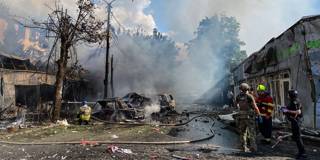Despite overwhelming public support, domestic partisan disputes prevent Western countries from delivering crucial aid to Ukraine. To ensure that support for the war effort is not overshadowed by unrelated events, Ukraine’s allies must establish a long-term rainy-day fund, financed by the returns on Russia’s frozen assets.
STOCKHOLM/BERKELEY – With each passing day, it becomes increasingly evident that Western support for Ukraine has become ensnared in various domestic and geopolitical developments that have nothing to do with Ukraine’s struggle to defend itself. As Russia’s war of aggression approaches its second anniversary, it is crucial to establish a more resilient and stable funding mechanism.
Although economists rarely agree on anything, there is a broad consensus that the cost of failing to provide Ukraine with enough support to win the war would be far greater than the cost of assisting it. But the current funding model relies heavily on tense last-minute negotiations among lawmakers in the United States and the European Union, and the resulting uncertainty inflicts enormous costs on Ukraine’s economy and undermines its political stability.
The problem is compounded by political divisions within and among Western countries. Regardless of Ukraine’s actions, the war is often overshadowed by other domestic and international conflicts, impeding efforts to deliver military aid despite overwhelming public and political support. Hungarian Prime Minister Viktor Orbán’s attempt to block a €50 billion ($55 billion) EU aid package for Ukraine and the US Republicans’ use of Ukraine aid as a bargaining chip in addressing the migration crisis at the US-Mexico border are prime examples.

STOCKHOLM/BERKELEY – With each passing day, it becomes increasingly evident that Western support for Ukraine has become ensnared in various domestic and geopolitical developments that have nothing to do with Ukraine’s struggle to defend itself. As Russia’s war of aggression approaches its second anniversary, it is crucial to establish a more resilient and stable funding mechanism.
Although economists rarely agree on anything, there is a broad consensus that the cost of failing to provide Ukraine with enough support to win the war would be far greater than the cost of assisting it. But the current funding model relies heavily on tense last-minute negotiations among lawmakers in the United States and the European Union, and the resulting uncertainty inflicts enormous costs on Ukraine’s economy and undermines its political stability.
The problem is compounded by political divisions within and among Western countries. Regardless of Ukraine’s actions, the war is often overshadowed by other domestic and international conflicts, impeding efforts to deliver military aid despite overwhelming public and political support. Hungarian Prime Minister Viktor Orbán’s attempt to block a €50 billion ($55 billion) EU aid package for Ukraine and the US Republicans’ use of Ukraine aid as a bargaining chip in addressing the migration crisis at the US-Mexico border are prime examples.